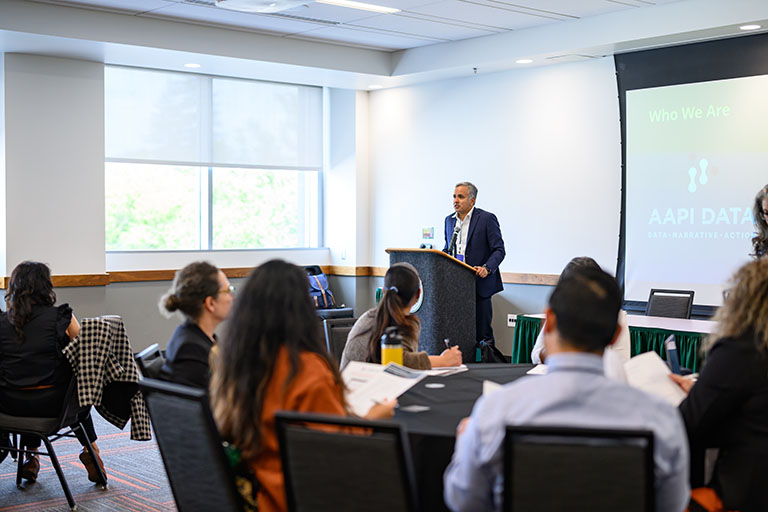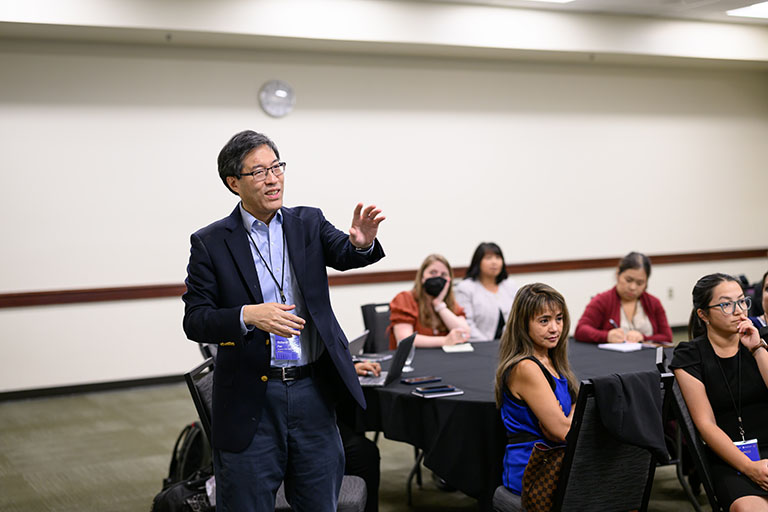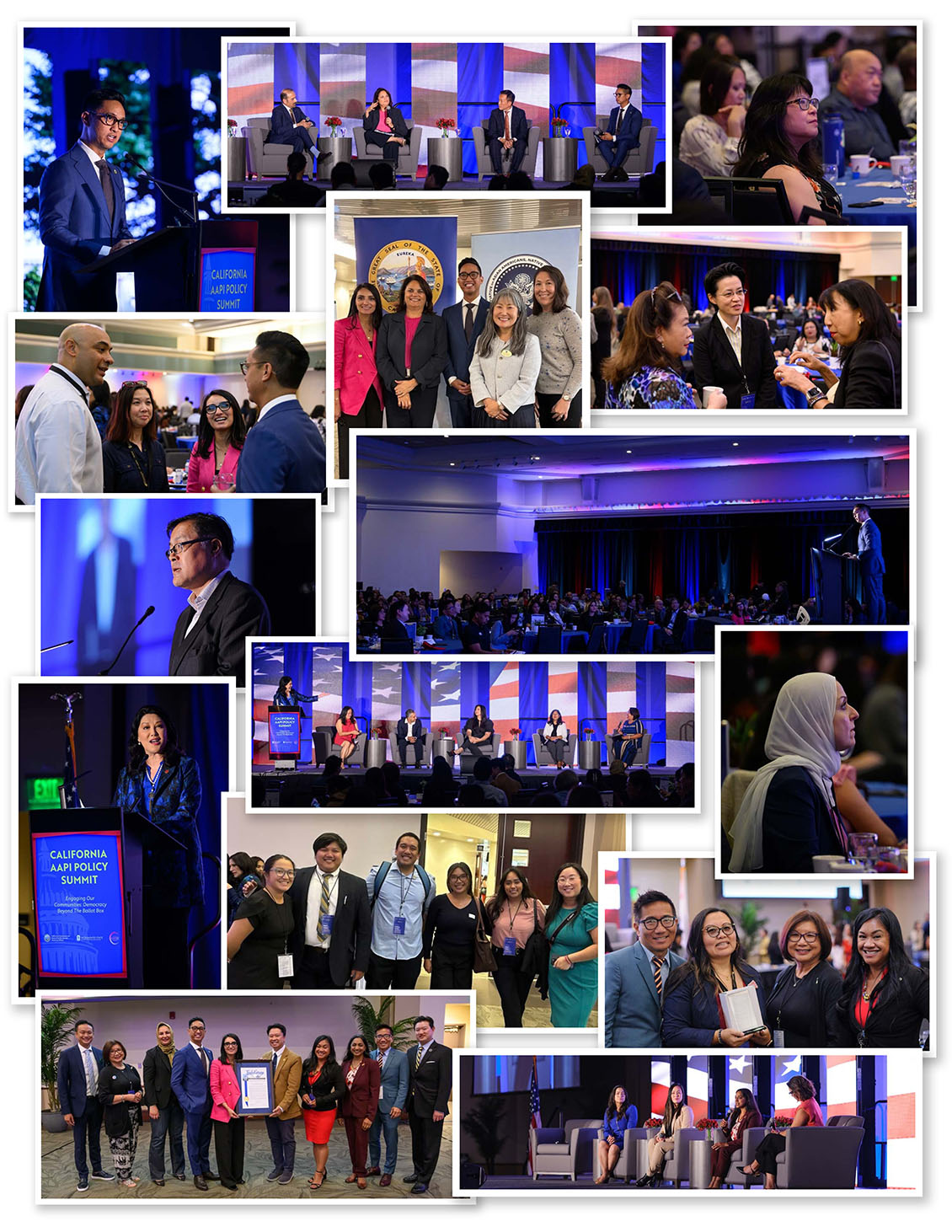Summits
September 18, 2024
AAPI Statewide Policy Summit “Engaging our Communities: Democracy Beyond the Ballot Box”
The California Commission on Asian & Pacific Islander American Affairs (CAPIAA), in partnership with Sacra-mento State and the California Asian American & Pacific Islander Legislative Caucus (AAPILC), organized the Inaugural Asian American Pacific Islander (AAPI) Statewide Policy Summit “Engaging our communities: Democracy Beyond the Ballot Box.”
The event brought together 500+ individuals representing hundreds of AANHPI community organizations, state elected officials and appointees, philanthropic organizations, and various stakeholders from across the state. Participants engaged in meaningful discussions about leveraging our shared history and addressing the issues that impact AANHPI communities. The summit fostered a sense of unity and collaboration among AANHPI leaders and organizations dedicated to promoting civic participation and community empowerment through a series of engaging panels and strategy sessions.
The summit speakers collectively underscored the importance of unity and advocacy within the AANHPI community. The panel discussions engaged with critical issues, including voter mobilization and education, effective state governance, federal investments and their local impacts, and the political contributions of AANHPI women.
This year, the Commission recognized former Chairs Dr. Villavicencio and Dr. Karthick Ramakrishnan and Nkauj Iab Yang for their work in uplifting the AANHPI community in California. Dr. Villavicencio and Dr. Karthick Ramakrishnan both played a key role in securing the historic API Equity Budget and California Asian American, Native Hawaiian, Pacific Islander Student Achievement Program (CA AANHPI SAP). Nkauj Iab was the inaugural Executive Director of the Commission. CAPIAA has been able to build off their foundational work and we are grateful for their leadership.
Overall, the event successfully reinforced the commitment to empowerment, collaboration, and the importance of data-driven advocacy, paving the way for a stronger, more engaged AANHPI community in the future.
After the AAPI Policy Summit, I was inspired to share with my network what I learned, especially the statistics that highlighted the many voting disparities in the AAPI population; including the budget spent on marketing to the AAPI community and the percentage of how many register to vote versus how many actually vote. I encouraged others to register, take the time to be informed, and to mail in/drop off their ballots. I also held a ‘meet and greet’ to support one of the candidates for mayor in my city. Thanks for putting on such an impactful event.
Strategy Sessions
Strategy sessions encouraged participants to explore ways to engage with policymakers and advocacy for state resources, utilize data effectively to uplift AANHPI communities, and power-building in the AANHPI community.
Community Power Building
Hosted by APAPA, EPIC, and AJ SoCal, this session highlights the challenges and opportunities facing AANHPI communities in civic engagement and accessibility. Tackling these issues requires a multi-faceted approach focused on voter engagement, leadership development, and grassroots advocacy through voter mobilization and education, increased mentorship programs, and continued coalition building within the AANHPI community.
Civic Engagement: AANHPI communities remain underrepresented in leadership roles and electoral participation, with Asian Americans registering lower voter turnout compared to other demographics. The AANHPI community needs to engage and mobilize to encourage voting actively.
NHPI Resources: As the NHPI community grows in California, there is an increasing need for culturally relevant resources to support their well-being. Policymakers should consider the needs of NHPIs at all levels of government. The lack of disaggregated data and limited language accessibility have created significant barriers for the NHPI community, especially in healthcare and career development fields. Building coalitions is essential to ensure our AANHPI communities can be civically engaged in the political discourse and empowered as a community.
The primary takeaways for all of the hosts included empowering our AANHPI communities to involve cultivating a new generation of community organizers.


Better Data for Better Advocacy
Hosted by AAPI Data, this session emphasized the importance of democratizing data and fostering data literacy to empower the AANHPI community in effectively advocating for their needs.
Participants learned how to utilize the Data-Narrative-Action (DNA) Frame-work and community-friendly tools to extract and analyze disaggregated data for advocacy and community empowerment. Participants, including Assembly-member Mike Fong, actively engaged in exploring invisibilized AANHPI communities and regional dynamics, with strong interest in applying these tools in higher education and advocacy efforts.
To learn more about the AANHPI Community Data Explorer, visit: explore.aapidata.com.
API Equity Budget 2.0 - Budget Advocacy
Hosted by the AAPI Equity Alliance, this strategic session highlighted how understanding the California State budget and effective advocacy can address the needs of AANHPI communities.
This session covered Stop the Hate (STH) program, a powerful example of the community coming together to address hate using state-allocated funds. AAPI Equity Alliance, a grantee of the STH program, demonstrates the impact of state resources when the government reinvests in its diverse community.
Participants gained practical strategies for advocacy, including tips on how to identify and engage with policymakers and decision-makers. They also learned to create data-driven messages supported by real-life anecdotes and how to use media to amplify their causes.


